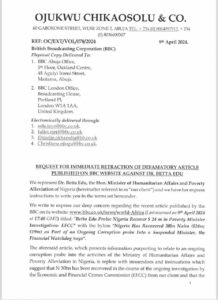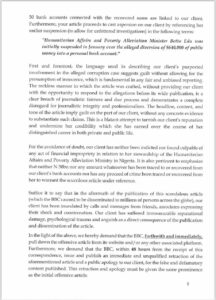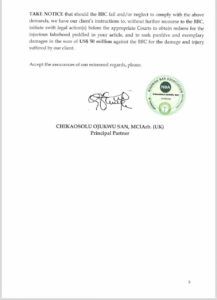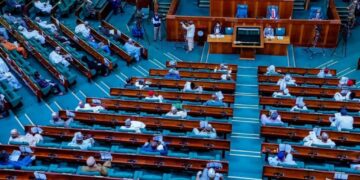The suspended Minister of Humanitarian Affairs and Poverty Alleviation, Dr Betta Edu, has threatened to file a lawsuit against the British Broadcasting Corporation (BBC) for allegedly defaming her personality.
Edu disclosed this in a letter dated April 9, 2024, sent to BBC Abuja and London offices by her counsel, Chikaosolu Ojukwu (SAN), a copy of which was sighted by LEADERSHIP.
According to the letter, the suspended minister claimed that BBC reported that N30 billion was recovered from her in the ongoing probe of the National Social Investment Programme Agency (NSIPA) by the Economic and Financial Crimes Commission (EFCC).
The lawyer alleged that the publication, which he described as false, had dented the reputation of his client, Edu.
Ojukwu, therefore, asked BBC to retract the report and tender a public apology to Edu over the matter within 48 hours, saying that, “Our client has suffered immeasurable reputational damage, psychological trauma and anguish as a direct consequence of the publication and dissemination of the article.”
Edu is also demanding $50 million from the UK-based media organisation as compensation, and threatened to take legal action against BBC.
“We write to express our deep concern regarding the recent article published by the BBC on its website: www.bbc.co.uk/news/world-Africa (Last accessed on 9th April 2024 at 17:40 GMT) titled: “Betta Edu Probe: Nigeria Recover $24m in Poverty Minister Investigation- EFCC” with the byline ‘Nigeria Has Recovered 30bn Naira ($24m; £19m) as part of an Ongoing Corruption probe Into a Suspended Minister, the Financial Watchdog Says’.
“The aforesaid article, which presents information purporting to relate to an ongoing corruption probe into the activities of the Ministry of Humanitarian Affairs and Poverty Alleviation in Nigeria, is replete with innuendoes and insinuations which suggest that N30bn has been recovered in the course of the ongoing investigation by the Economic and Financial Crimes Commission (EFCC) from our client and that the 50 bank accounts connected with the recovered sums are linked to our client.
“Furthermore, your article proceeds to cast aspersion on our client by referencing her earlier suspension (to allow for unfettered investigations) in the following terms: “Humanitarian Affairs and Poverty Alleviation Minister Betta Edu was initially suspended in January over the alleged diversion of $640,000 of public money into a personal bank account.”



“First and foremost, the language used in describing our client’s purported involvement in the alleged corruption case suggests guilt without allowing for the presumption of innocence, which is fundamental in any fair and unbiased reporting. The reckless manner in which the article was crafted, without providing our client with the opportunity to respond to the allegations before its wide publication, is a clear breach of journalistic fairness and due process and demonstrates a complete disregard for journalistic integrity and professionalism.
“The headline, content, and tone of the article imply guilt on the part of our client, without any concrete evidence to substantiate such claims. This is a blatant attempt to tarnish our client’s reputation and undermine her credibility which she has earned over the course of her distinguished career in both private and public life.
“For the avoidance of doubt, our client has neither been indicted nor found culpable of any act of financial impropriety in relation to her stewardship of the Humanitarian Affairs and Poverty Alleviation Ministry in Nigeria. It is also pertinent to emphasize that neither N30 billion nor any amount whatsoever has been traced to or recovered from our client’s bank accounts nor has any proceed of crime been traced or recovered from her to warrant the scurrilous article under reference.
“Suffice it to say that in the aftermath of the publication of this scandalous article (which the BBC caused to be disseminated to millions of persons across the globe), our client has been inundated by calls and messages from friends, associates expressing their shock and consternation. Our client has suffered immeasurable reputational damage, psychological trauma and anguish as a direct consequence of the publication and dissemination of the article.”





